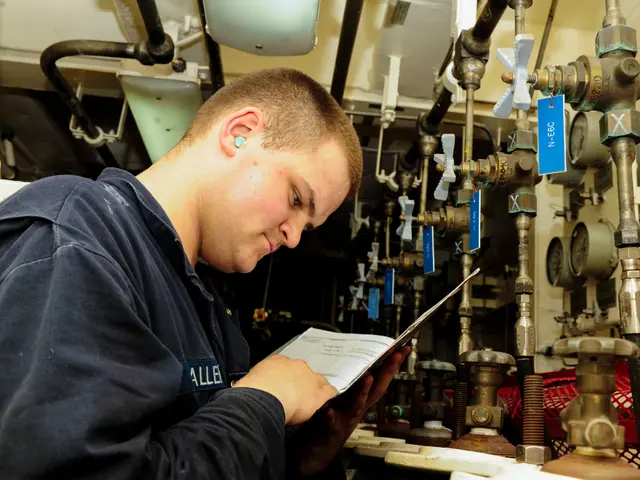Drivers call for judicially mandated alcohol sensors (alcolocks) to combat drink driving issues.
Rewritten Article:
Drink-driving reoffending triggered calls for breathalyzer devices in vehicles.
These gadgets, better known as alcolocks, prevent a car from starting if there's any alcohol detected in a driver's breath sample, which must be provided before every journey.
Following data suggesting tens of thousands of convicted drink drivers continue to drink and drive, nearly half of the drivers polled by the RAC expressed their support for courts being allowed to order these alcolocks installed in offenders' cars.
More specifically, 53% of respondents gave the green light for the Government to adopt this method, already in practice in countries such as Australia, Belgium, and parts of the US.
Advocating for their implementation, Simon Williams, RAC head of policy, stated: "Every year, countless lives are lost and shattered due to drink-driving. It's clear that many of those caught by the police are repeat offenders, which highlights the need for a different approach to tackle this dangerous behavior."
While not universally accepted, 75% of those surveyed agreed that intervention is required to decrease drink-driving. In contrast, 23% disagreed, and another 23% remained undecided.
Evidence suggests that alcolocks can be crucial in reducing drink-driving, particularly in countries that already use them. With 27,000 individuals convicted of multiple drink-driving offenses in the 11 years leading up to July 2024, the RAC urges the Government to consider adopting this strategy.
Williams added, "Some might perceive the devices as lenient, but experience from other countries suggests otherwise. Banning habitual drink-drivers doesn't seem to be the solution, as they often continue drinking and driving despite facing prison sentences."
Seat is one of several car manufacturers that have demonstrated the integration of alcolocks in their vehicles.
Further Reading
# Designated Driver Role Could Become Expensive with Car Insurance Pitfalls
What are Alcolocks? Will they become standard?
While alcolocks, or alcohol-interlock devices, might be unfamiliar to some, they are essentially breathalyzers connected to a vehicle's ignition system. When fitted, a driver must offer an alcohol-free breath sample before starting the engine, usually for about five seconds. If alcohol levels surpass a set limit, the engine won't start.
Details about the compulsory implementation and funding of these devices vary. In some countries, Mandatory usage is limited to reoffenders or anyone convicted of drink-driving, with the offender typically responsible for the cost. However, in instances of financial difficulty, the state may cover the expense.
In July 2024, the EU introduced new regulations requiring all new cars sold in the EU to be ready to have an alcolock fitted.
Related Articles
Previous
1
Next
MPs Urge Immediate Implementation of Alcolocks in Cars
New AI Cameras to Detect Drunk Drivers in the UK
Share this article
How this is Money Can Help
10 Strategies for Affordable Car Insurance
Alcolocks and their application in various countries
Alcolocks are already in use in several countries, including Finland, Belgium, New Zealand, Australia, Canada, and multiple parts of the US. In these countries, convicted drink drivers face temporary bans before returning to driving as long as they have an alcohol-interlock device installed in their vehicle for a specified period—usually a year. For instance, a driver in New Zealand may have the device removed after 12 months provided they maintain zero alcohol readings during the last six months; otherwise, they continue using the device until clean for six consecutive months.
Following a clean period, they receive a zero-alcohol license for three years, with severe penalties for any alcohol detection while driving.
When asked about the idea of adopting a similar approach in the UK, two-thirds of those surveyed expressed support, while 15% were opposed, and a fifth remained undecided.
Williams concluded, "Currently, courts have limited options to combat drink-driving, including disqualification, driver rehabilitation, or custodial sentences for repeat offenders. The possibility of court orders mandating alcohol-interlock devices to prevent reoffending is worth exploring during future trials. We hope the Government considers this when developing their upcoming road safety strategy."
- The finance industry might play a significant role in the installation of alcolocks, as the costs of these devices could potentially be covered by the offender or the state for those facing financial difficulties, as seen in some countries.
- In the transportation sector, the use of alcolocks could become more widespread, as they have been proven effective in reducing drink-driving and are already implemented in several countries within the insurance industry, such as Finland, Belgium, New Zealand, Australia, Canada, and parts of the US.








